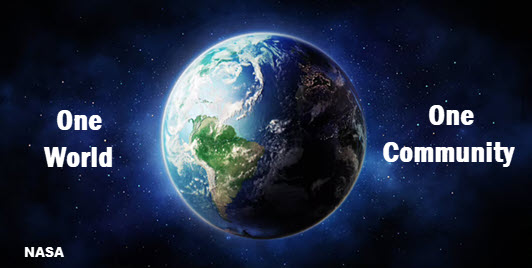Shaping a Better Future By Recognizing the Interdependence of the World
Posted October 27, 2020 08:58 am | Op-Ed

NASA photo | Columbia County Observer graphic
One lesson that the COVID-19 pandemic and the ensuing global economic recession have taught us: we live in a world so interconnected and interdependent it has effectively become a single organism.
No amount of denial will change this reality. On the contrary, such denial will only cause us to suffer more intensely. We will be better off if we recognize and embrace this reality.
Acceptance means that the world is so interconnected it is truly like a single body, and it is futile for any person or nation to claim that it can go it alone without the support and aid of the rest. Going alone would be as nonsensical as the liver telling the kidneys that it does not care if the kidneys are diseased because it is only concerned with its own health. It is similarly untenable for any nation to tell another that its problems are its own and of no interest to others.
The growing litany of challenges that have been plaguing the world for years — climate change to the current pandemic — are demonstrating with increasing clarity that in today's world, the advantage of one nation can only be guaranteed by assuring the advantage of the whole world, just as the well-being of any one organ of the body is dependent on the systemic health of the body as a whole.
Once we understand this truth, the next logical step for humanity is to put aside the childish passion of nationalism and develop new capacities such as consultation, collaboration, and cooperation.
Many of our most intractable challenges are global: climate change, the threat of nuclear war, COVID-19 and other pandemics, global economic recessions, and terrorism. We find ourselves entirely lacking the collective decision-making and enforcement institutions we so desperately need to effectively tackle these global challenges, challenges which demand global solutions.
Now, more than ever, we need to have an infrastructure of global governance that includes a world legislature that has democratic legitimacy, allowing for the voices of people of all nations to be adequately heard in frank and respectful consultation.
Imagine how much better off we would all be during this pandemic if such a system of global governance existed today?
Equally important, we need to develop the skill of electing worthy leaders who possess the skills and character necessary to make service to humanity’s collective interest a prime consideration in all their decisions.
Honing this skill of picking fit leaders, who are aware of our world's interconnectedness, begins in our elections at home.
When we think about electing a public servant at the local, state, or national level, we should seek out a person who recognizes their job is to guarantee the well-being of the people who elect them while recognizing the collective interests of their communities and the community of nations.
---------
Sovaida Maani Ewing is an author, speaker, lawyer, founding director of the Center for Peace and Global Governance, and member of the Board of Directors of Citizens for Global Solutions Education Fund. This piece was syndicated by PeaceVoice and was reprinted by the Columbia County Observer with permission or license.

 By
Sovaida Maani Ewing
By
Sovaida Maani Ewing